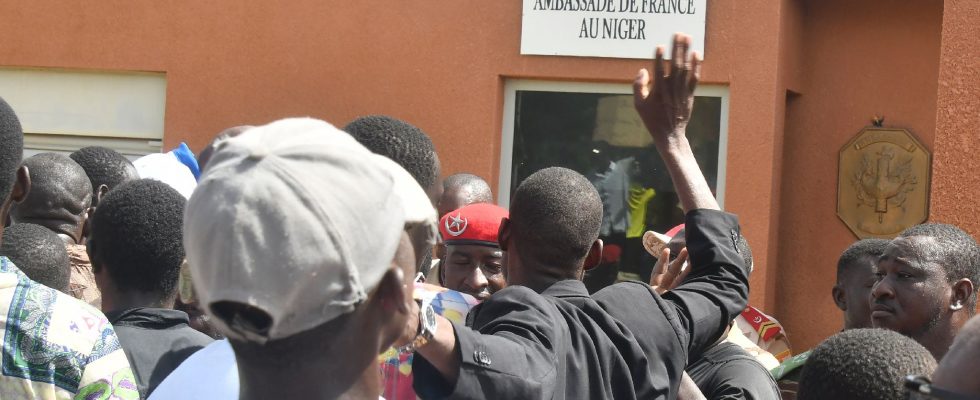Tensions are rising between Niger and its former international partners. This Sunday, July 30, thousands of Nigeriens demonstrated in front of the French Embassy in the capital Niamey. National symbols of the former colonizing country have notably been replaced by Russian and national flags, prompting the Elysée to threaten “anyone who attacks French nationals, the army, diplomats and rights of way” to “replicate immediately and intractably.”
The demonstrators had gathered in support of the new military regime in power following a recent coup. On Wednesday July 26, the presidential guard led by General Abdourahamane Tiani dismissed the elected president Mohamed Bazoum, with the support of the army.
Appointed president of the National Council for the Safeguarding of the Fatherland (CNSP), the new strong man of the country suspended the institutions, closed the land and air borders then established a curfew from midnight to 5 am. This coup was justified by “the deterioration of the security situation” in the country, according to the junta, referring to the multiple jihadist attacks faced by Nigerien soldiers. Since Wednesday, Niger’s African and Western allies have condemned this coup and have used numerous levers to put pressure on the new regime.
Budgetary aid questioned
One of them: questioning the aid granted to the African state. If the UN finally announced on Friday that it will continue its humanitarian and peacekeeping operations in Niger despite the closure of the borders, the European allies are not of the same opinion. Even before raising the tone concerning its possessions in Niger, France refused, on Saturday, to recognize the legitimacy of the junta in power, demanding “the return without delay to the Nigerien constitutional order”. Above all, the Ministry of Foreign Affairs announced the suspension of all its budgetary aid, including official development aid for Niger, estimated at 120 million euros in 2022.
A similar measure has been taken by the European Union. According International mail, the EU commitment amounted to €503 million over the period 2021-2024. A shortfall that could prove significant for Niger, one of the poorest countries in the world and of which 4 of the 26 million inhabitants need humanitarian assistance. The United States, another ally of the Niger state, reaffirmed on Friday its “unwavering support” for President Mohamed Bazoum through the voice of Secretary of State Antony Blinken. Without an announcement of suspension, the head of American diplomacy however specified that the coup d’etat could call into question “hundreds of millions of dollars of aid”.
Military support in the hot seat
On the same day, the spokesman for the American National Security Council, John Kirby, indicated that the coup d’etat risks ending “cooperation, military or not” between the United States and Niger. About 1,100 American soldiers are indeed present in the country to fight against jihadist attacks in the Sahel.
This variable has also been used by the European Union, which has been supporting the Nigerien military in particular as part of the Eucap mission since 2012. The EU announced on Saturday that “all its cooperation actions in the security field” were suspended. for an indefinite period, according to a statement by its head of diplomacy Josep Borrell.
If no announcement has been made for the moment, this choice could also be imposed on France: 1,500 French soldiers are currently operating on Niger soil, in support of the local army. A presence criticized by part of the local population but described as “appreciable” by the new head of the junta, although he asked Westerners to trust the local security forces.
Sanctions to come by its African neighbors
This Sunday, France also affirmed its “support for all regional initiatives” with a view to restoring order in Niger. Because the international consequences of the putsch in Niger are also observed in its African neighborhood. As of Friday, the African Union Peace and Security Council demanded an “immediate return” of the soldiers to their barracks, also giving the junta a 15-day ultimatum to restore “constitutional authority”. Above all, the alliance of 55 African states, of which Niamey is a member, says it is ready to take “all necessary measures, including punitive sanctions, against the perpetrators, in the event that the rights of political detainees are not violated. respected”.
If the Union does not specify the consequences of non-compliance with this ultimatum, another African organization wants to be more threatening. This Sunday, July 30, the Community of West African States (ECOWAS), of which Niger is also a member, met exceptionally at its headquarters in Abuja (Nigeria) to decide on the fate of the military regime.
In addition to announcing the suspension of “all commercial and financial transactions” between its member states and Niger, as well as “a freezing of assets for military officials involved in the attempted coup”, the regional body also gives a one-week ultimatum to the junta to release President Bazoum and organize a “return to constitutional order”, otherwise it does not rule out a “use of force”. A threat that seems to confirm the narrative of the military regime: as of Saturday evening, a member of the junta on national television denounced an “imminent military intervention in Niamey”. For Niger, yesterday’s allies are now today’s enemies.
